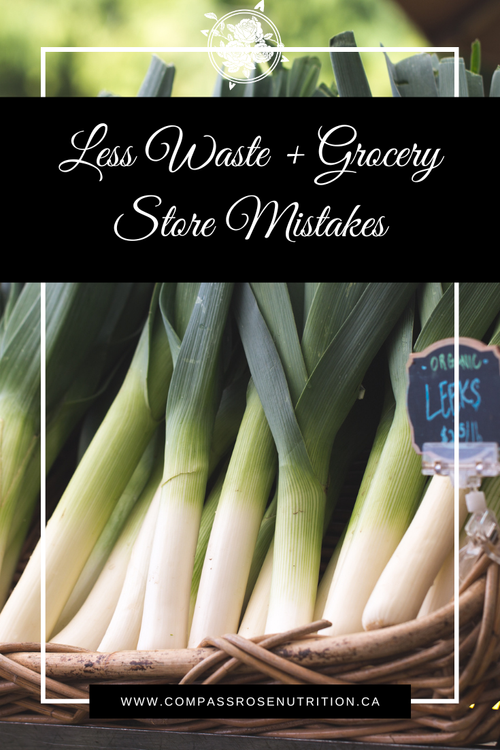With the cost of food on the rise, we all want to make sure our food stays fresh and that we are spending our money wisely on groceries. Without even realizing it, you could be making some common mistakes that dramatically shorten the lifespan of the groceries you bring home each week.
I’m here with some helpful tips to make your money and groceries go a bit further, and lessening food waste in your home.
According to the EPA in the United States, 38.1 million tons of food waste was created in 2017. it's hard even to imagine how much 1 ton of food is, but 38.1 tons is unfathomable. And this doesn’t just happen in the US, it happens here in Canada and around the world to different extents.
Food waste is a problem for several reasons, and we can and should take small steps each day to do our part in lessening that number.
While you're throwing away your hard-earned money on food you didn't eat, you're also contributing to the methane emissions and adding to your carbon footprint. Food waste will inevitably happen, but there are several helpful tips to keep it at a minimum.
Let’s start before you even go to the grocery store.
Plan your meals
This might be obvious, but the key factor so many of us forget when planning our weekly shopping list is how many times we'll use the ingredients called for in a recipe. Putting quantities on your list helps you avoid buying too much. It also will save you extra trips to the store when you realize you didn't buy enough.
Check your pantry first
Ever run to the store to get more of a particular item, only to find you had plenty of it? With packaged goods like pasta, it's not a big deal, but with things that have a shelf life, you wind up wasting more food. Look in your cabinets and fridge first. Some ingredients might not be obvious as to what you can use them for, so Google them, and you'll be amazed at the recipes you can come up with using what you have on-hand.
Don't bulk buy unless you're using it all
Bulk buying is useful for certain things, like toilet paper. If you have a large family, buying in bulk does help a lot in some instances with certain products. But buying bulk just to get a good deal? Not always a smart idea. Unless you can freeze it or it won't expire any time soon, buying bulk might not be the best option. One way you can use bulk to your advantage, though, is to buy in bulk with a neighbor or family member. That way, you can split the cost and split the goods! So in general, non- perishable items are great to buy bulk if it saves you money or time. Perishable items should not be bought bulk unless you are going to freeze, preserve or share them.
Organize your food spaces
If you want to stop throwing out money from wasting food, start organizing. Clean out the fridge and keep a habit of putting older stuff in the front, so you remember to use it.
Learn how to store food for optimum freshness
There are a few tricks you can learn about maximizing the freshness potential of fruits and vegetables in your fridge. Taking the time to properly store them once you bring them home will go a long way in preventing food waste. For example, berries shouldn't be washed until you're ready to eat them, and tomatoes, apples, and bananas can make other produce spoil faster - so keep them separated.
Do your meal prep right after shopping
You are never going to snack on those veggies if you don't prep them and have them at eye-level in your fridge. On the other hand, you're much more likely to call for pizza delivery if you don't have all your ingredients prepped for busy weeknights. Take the time to handle it when you have downtime. It may seem like a chore, but once you get into it, you'll wind up with more free time to enjoy yourself with and less wasted food. Use this food prep time to listen to your favorite podcasts or a book on audible. Find something that makes you look forward to doing it -- and it'll become a mini-highlight of your week.
Don't overlook fruits and veggies past their prime.
You can turn brown bananas into banana bread, make soups and stir-fry out of those veggies, and so much more. Even stale (but not moldy) bread can become croutons or a superb French toast.
Learning how to make do with what you've got will help you cut out the food waste and have more money to spend on you!
Next up, once you go to the grocery store or cook your meals, let’s make sure the food we do purchase lasts as long as possible.
Here’s some helpful storage hacks to prolong the life of the items you buy:
Putting warm food in the fridge.
You might be putting away some leftover soup from the dinner you made, or you could be prepping for the week ahead. Keep in mind that food needs to be cooled down before popping the lid on it and tossing it into the cold. By adding hot food to the cold environment, you could potentially bring down the overall temperature of your refrigerator, putting your other items at risk.
Storing nuts on the counter.
You may be tempted to use storage containers like Mason Jars to store your nuts in the cupboard. They're great for organization and look nice, but they do no favors to the nuts you're storing. Nuts stored at room temperature can actually go bad more quickly. They have high levels of unsaturated fat, which can lead to a rancid taste when exposed to light and warmer temperatures. Storing nuts in the fridge or freezer will keep them safe and delicious for much longer--even up to a year in some cases. So put your almonds into a mason jar, but keep it in your fridge where it’s still handy and fresh.
Washing produce too soon.
If you're a meal prepper, you may be used to shopping, unpacking, washing, and storing all of the produce in one afternoon. In some cases, washing the produce as soon as you buy it can cause it to go bad more quickly. The added moisture, paired with airtight containers, can be a breeding ground for mold and decay. Instead, wash right before using, even if you have already pre-cut and stored your produce for meal prep purposes. And in the case you need it washed ahead of time for convenience, try using a salad spinner to wick out any extra moisture before storing your produce.
Storing onions and potatoes together.
When you store onions and potatoes in the same place, even a cool and dark spot, you may notice the potatoes don't last as long. Onions emit a gas that causes potatoes to sprout—and then rot—faster than they would if stored further apart.
Refrigerating your bread.
Keeping bread in the cold may seem like a smart way to prolong its life, but this is actually the opposite. The cold causes the bread's starch molecules to crystalize, which leads to dehydration. This process, called retrogradation, makes bread go stale quickly. Instead, keep bread in a cool pantry or even in the freezer since these temps don't allow the retrogradation process to take place.
These tips and tricks will not only keep food from spoiling as quickly, but it will ultimately have your meals tasting better, too.
Shopping smart is important to save time, money and lessen food waste. I hope this gives you a couple ideas to shift to in your next meal planning session!
If you have tips, share with us below.
Want more tips, recipes, and food guides? Sign up for free to my Nutrition and Wellness Library below.




